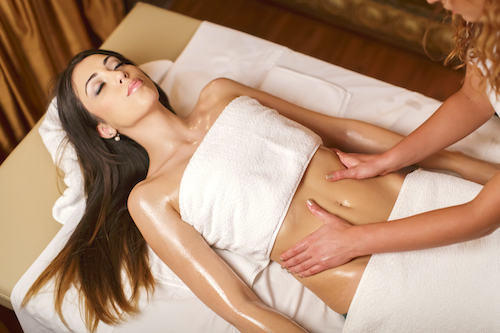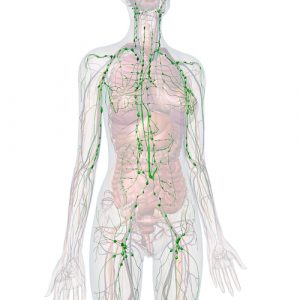What is Lymphatic Massage?

“Lymphatic Massage” is a term that is used a lot in the plastic surgery recovery world, but you don’t always get the same thing going to different practitioners who claim they offer it. Because of this it is very important to understand what exactly you should be getting after surgery, and what you should avoid for your health and safety.
Confusion Over What Lymphatic Massage Is
Actual lymphatic massage is a very highly specialized gentle skin stretching technique that picks up fluid from a swollen area, then moves that fluid inside the lymphatic system along pathways known as lymphatic vessels. The fluid is returned to the bloodstream where the kidneys pull it out. From there the fluid is excreted as urine.
The proper term for lymphatic massage is “Manual Lymphatic Drainage (MLD).” MLD is often confused with something called “incisional drainage” where fluid is pushed out of the holes left behind by the surgeon.
True lymphatic massage (MLD) uses the body’s own internal drainage system that is designed to remove swelling.

The Lymphatic System
You probably are asking yourself why you need massages if the body already has a way to remove the swelling, and why isn’t it doing its job on its own after surgery?
These are great questions. The lymphatic system removes more than just fluid. It takes up the “garbage” from around our cells as well. This garbage includes dead cells that were damaged during surgery. It can become clogged up just like your kitchen sink after doing the dishes. Lymphatic massage is a gentle and effective way to help move that gunk along and reopen the pathways so they function better.
Additionally, plastic surgery cuts through many lymphatic vessels making it work less efficiently for a while until the vessels regrow. Lymphatic massage can re-route the fluid through nearby vessels and encourage the damaged vessels to repair quicker by relieving their workload.
This is Important:
Incisional Drainage is NOT Lymphatic Massage!
- Incisional Drainage is where someone pushes fluid out of the holes left behind by the surgeon. The fluid never enters the lymphatic system, so there is nothing lymphatic about it.
- The people calling Incisional Drainage “lymphatic massage” are using the wrong term.
- Ask your therapist before you go for your “lymphatic massage” whether they will be pushing fluid out of the holes or not.
- Incisional Drainage is painful. Manual Lymphatic Drainage is relaxing and soothing.
- Incisional Drainage requires the reopening of incisions, potentially causing infection. Manual Lymphatic Drainage can be done while never getting near open incisions, helping protect you from infection.
- Incisional Drainage is usually done by people with little to no training. True Manual Lymphatic Drainage is done by highly-trained professionals.
- Incisional Drainage causes more inflammation which delays healing. Manual Lymphatic Drainage removes the chemical messengers that cause inflammation, thereby reducing inflammation and speeding up the healing process.
Do I Really Need Massages After Plastic Surgery?
This is a question that you will see asked over and over and over on facebook and similar social media outlets. There is a huge debate over whether massages are necessary.
Some people will say that the massages were “the worst experience of their life” and will try to persuade others to not go through it. (These people got incisional drainage rather than true manual lymphatic drainage.)
Other people will go on and on about the amazing response their bodies had to true lymphatic work. They will say how they think people who don’t get them are crazy for not doing so.
So what’s the truth?
Science has shown the many benefits to getting real lymphatic massage (MLD). It helps to reduce swelling and bruising; it reduces pain; it helps to prevent or reduce fibrosis (if it has already formed before someone started getting massages); it helps to improve the texture and appearance of scars; and it helps prevent infection.
Please take time to check out the links in the previous paragraph. Don’t believe it just because it is written here. Believe it because there is research behind it.
Why Do Some Doctors Say No to
Lymphatic Massage After Plastic Surgery?
It is true that some doctors say they don’t want you to get a lymphatic massage after plastic surgery. Let’s take a look at why this happens. There are several possible reasons.
- The doctor is familiar with the dangers of incisional drainage and believes that is what you are asking them about. (Remember that many people who offer incisional drainage wrongly call it “lymphatic massage.”) It’s dangerous and causes inflammation, so they are saying no because they don’t want you to get hurt or get an infection.
- Doctors know very little about the lymphatic system. Most physicians only get an hour or two of training in all of medical school. Because of this, most doctors do not know about the benefits of true manual lymphatic drainage. This may seem very far-fetched, but those of us who are in the professional field of lymphatics know very well that people who have had lymph nodes removed in cases of breast and reproductive cancers are not warned about developing lymphedema – a non-reversible condition caused by disruption of the lymph nodes – even though it is a well-documented fact.
- Surgeons know how to do surgery, not how to facilitate healing. While there are some wonderful surgeons who do really care about their patients and their recovery, they aren’t at all familiar with the day-to-day healing process. They simply do not understand the significance of the effect a good lymphatic session can have on a patient. This is not a failing of the surgeon, it’s a failing of our medical system. As a result, surgeons only check you for expected “benchmarks” at certain intervals after surgery to see if you are developing any significant problems at that stage in recovery and then send you home to recover with very little instruction. Why? It is what they were taught to do.
Did you know that in Germany lymphatic drainage is standard care after surgery? Here, most surgeons have never even heard about it – and if they have, it is often what was referred to in item #1 in this list – they think you mean incisional drainage, not true lymphatic work. - Another factor is that sometimes surgeons have extra big egos. There are some surgeons who believe that they are the only thing you need to heal. Thank goodness this isn’t true of most surgeons, but they are out there.